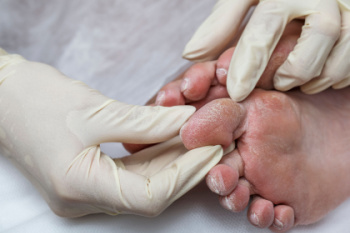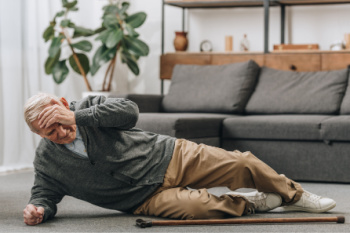
Diabetes significantly affects foot health due to the condition's influence on circulation and nerve function. Poor blood flow, a common complication, hinders the healing process and increases the risk of infections. Nerve damage, or neuropathy, reduces sensation in the feet, making it difficult to notice injuries or pressure sores. These issues can escalate to serious infections or ulcers if left untreated, potentially leading to amputations. Maintaining proper foot care and regular check-ups are essential for individuals with diabetes to prevent severe complications. Simple practices, such as daily inspections for cuts or blisters and wearing appropriate footwear, can make a substantial positive difference. Overall, understanding the connection between diabetes and foot health is important in managing the condition and preventing debilitating outcomes. If you have diabetes, it is strongly suggested that you are under the care of a podiatrist who can help you manage this serious condition.
Diabetic foot care is important in preventing foot ailments such as ulcers. If you are suffering from diabetes or have any other concerns about your feet, contact one of our podiatrists from Lovely Foot Associates, PC. Our doctors can provide the care you need to keep you pain-free and on your feet.
Diabetic Foot Care
Diabetes affects millions of people every year. The condition can damage blood vessels in many parts of the body, especially the feet. Because of this, taking care of your feet is essential if you have diabetes, and having a podiatrist help monitor your foot health is highly recommended.
The Importance of Caring for Your Feet
Patients with diabetes should have their doctor monitor their blood levels, as blood sugar levels play such a huge role in diabetic care. Monitoring these levels on a regular basis is highly advised.
It is always best to inform your healthcare professional of any concerns you may have regarding your feet, especially for diabetic patients. Early treatment and routine foot examinations are keys to maintaining proper health, especially because severe complications can arise if proper treatment is not applied.
If you have any questions please feel free to contact our office located in Johnstown, PA . We offer the newest diagnostic and treatment technologies for all your foot and ankle needs.

Obesity significantly increases the risk of developing plantar fasciitis, a painful condition that affects the heel and arch of the foot. Excess body weight places strain on the plantar fascia, the thick tissue band connecting the heel bone to the toes, leading to inflammation and microtears. This pressure not only causes severe pain but can also prolong the healing process. Individuals who are overweight are more likely to experience persistent pain and difficulty with daily activities, such as walking or standing. Extra body weight adds to other factors that contribute to plantar fasciitis, such as poor foot mechanics and inadequate footwear. If you are experiencing symptoms like sharp heel pain, particularly in the morning, it is suggested that you make an appointment with a podiatrist. This medically trained foot doctor can examine your feet and suggest treatment that may include orthotics, specific exercises, and weight-related lifestyle adjustments.
The more you weigh, the harder your feet must work to support your body. If you’re an obese individual and are concerned about your feet, contact one of our podiatrists from Lovely Foot Associates, PC. Our doctors can provide the care you need to keep you pain-free and on your feet.
Obesity and Your Feet
People who are overweight are putting more pressure on their ankles, knees, and hips as well as their feet. This unfortunately can lead to variety of different issues.
Problems & Complications Stemming from Obesity
If you have any questions, please feel free to contact our office located in Johnstown, PA . We offer the newest diagnostic and treatment technologies for all your foot care needs.
 Are your feet frequently cold or numb? If so, you may be experiencing poor circulation, a condition that affects blood flow to the feet. Poor circulation can lead to a range of uncomfortable symptoms, including cold feet, numbness, tingling sensations, and sometimes slowly healing wounds. This condition is often caused by underlying health issues such as diabetes, peripheral artery disease, or vascular problems. Ignoring poor circulation can lead to serious complications, including tissue damage and infections. Don't let poor circulation hold you back from enjoying life. If you are experiencing poor circulation in your feet, it is suggested that you schedule an appointment with a podiatrist to discuss treatment options and prevent any further complications or discomfort.
Are your feet frequently cold or numb? If so, you may be experiencing poor circulation, a condition that affects blood flow to the feet. Poor circulation can lead to a range of uncomfortable symptoms, including cold feet, numbness, tingling sensations, and sometimes slowly healing wounds. This condition is often caused by underlying health issues such as diabetes, peripheral artery disease, or vascular problems. Ignoring poor circulation can lead to serious complications, including tissue damage and infections. Don't let poor circulation hold you back from enjoying life. If you are experiencing poor circulation in your feet, it is suggested that you schedule an appointment with a podiatrist to discuss treatment options and prevent any further complications or discomfort.
While poor circulation itself isn’t a condition; it is a symptom of another underlying health condition you may have. If you have any concerns with poor circulation in your feet contact one of our podiatrists of Lovely Foot Associates, PC. Our doctors will treat your foot and ankle needs.
Poor Circulation in the Feet
Peripheral artery disease (PAD) can potentially lead to poor circulation in the lower extremities. PAD is a condition that causes the blood vessels and arteries to narrow. In a linked condition called atherosclerosis, the arteries stiffen up due to a buildup of plaque in the arteries and blood vessels. These two conditions can cause a decrease in the amount of blood that flows to your extremities, therefore resulting in pain.
Symptoms
Some of the most common symptoms of poor circulation are:
Treatment for poor circulation often depends on the underlying condition that causes it. Methods for treatment may include insulin for diabetes, special exercise programs, surgery for varicose veins, or compression socks for swollen legs.
As always, see a podiatrist as he or she will assist in finding a regimen that suits you. A podiatrist can also prescribe you any needed medication.
If you have any questions, please feel free to contact our office located in Johnstown, PA . We offer the newest diagnostic and treatment technologies for all your foot care needs.

As individuals age, the risk of experiencing a fall increases, posing significant threats to their health and independence. Understanding the factors that contribute to falls is vital in implementing preventive measures. Common risk factors for falling in older people include muscle weakness, balance impairment, vision problems, and certain medications that may cause dizziness or lightheadedness. Environmental hazards, such as uneven surfaces, poor lighting, or slippery floors also heighten the risk. Fortunately, proactive steps can be taken to reduce the likelihood of falls. Engaging in regular exercise to improve strength, balance, and flexibility can enhance stability and coordination. Conducting home safety assessments and making necessary modifications can help create a safer living environment. Included are installing grab bars, securing rugs, and improving lighting. Regular vision check-ups and medication reviews with healthcare providers help decrease potential risks. Falling can seriously impact the feet as well as other body parts. If this has happened to you, it is suggested that you visit a podiatrist who can assess your foot condition, provide treatment, and offer you effective fall-prevention techniques.
Preventing falls among the elderly is very important. If you are older and have fallen or fear that you are prone to falling, consult with one of our podiatrists from Lovely Foot Associates, PC. Our doctors will assess your condition and provide you with quality advice and care.
Every 11 seconds, an elderly American is being treated in an emergency room for a fall related injury. Falls are the leading cause of head and hip injuries for those 65 and older. Due to decreases in strength, balance, senses, and lack of awareness, elderly persons are very susceptible to falling. Thankfully, there are a number of things older persons can do to prevent falls.
How to Prevent Falls
Some effective methods that older persons can do to prevent falls include:
Falling can be a traumatic and embarrassing experience for elderly persons; this can make them less willing to leave the house, and less willing to talk to someone about their fears of falling. Doing such things, however, will increase the likelihood of tripping or losing one’s balance. Knowing the causes of falling and how to prevent them is the best way to mitigate the risk of serious injury.
If you have any questions, please feel free to contact our office located in Johnstown, PA . We offer the newest diagnostic and treatment technologies for all your foot care needs.